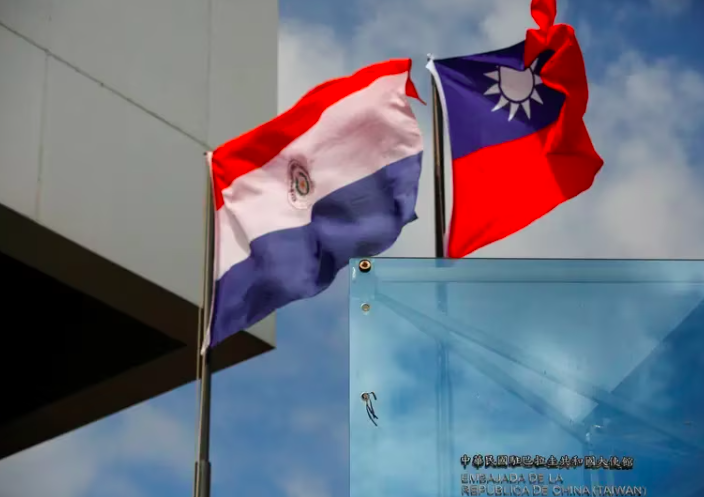By José Ignacio Araya
The conservative Colorado Party’s candidate consecrated the ruling party’s hegemony at Paraguay’s helm after winning over 15 points in Sunday’s elections.
However, the conflicts he will have to overcome seem to have been outlined before he took office, where economic problems, corruption, and drug trafficking are just some of them.

EIGHT ELECTIONS AND SEVEN VICTORIES
That is the record the ruling Colorado Party holds in the Paraguayan electoral arena, which achieved a comfortable victory over the opposition coalition this Sunday.
Thus, Santiago Peña, the ruling party’s candidate, will become the next President on August 15, the day he takes office.
With 42.74% of the votes, Peña defeated Efraín Alegre of Concertación Nacional, who obtained only 27.48%, establishing a distance of more than 15 points in a context in which the president is elected in the first round.
In several ways, Peña’s victory is unique.
In addition to being part of a string of pro-government governments since 1989, with the sole exception of the leftist ex-bishop Fernando Lugo, who presided over Paraguay between 2008 and 2012 and was later ousted by the Colorado Party itself, it is also a break with the dynamics of recent years in the region: a pro-government candidate who remained in power after the elections.
“The victory of the ruling party in Paraguay broke the trend of the punishment vote for the ruling parties that had been in force in the region since 2019″, explained Daniel Zovatto, regional director for Latin America and the Caribbean at the International Institute for Democracy and Electoral Assistance (International IDEA).
But it is also this concentration of power, analysts believe, that is the reason for one of the scourges plaguing the South American nation.
According to data published in January by Transparency International, Paraguay is the second country in the region with the worst corruption perception index, only surpassed by Venezuela.
Tiziano Breda, an expert researcher on Latin America for the Istituto Affari Internazionali (IAI) of Rome, told France24 that “the concentration of power in the hands of a party practically and the lack of alternation in power” contributes to “consolidate clientelist networks and a sort of assimilation between State and party, which notoriously favors corruption mechanisms.”
That is why in the United States, alerts were raised in the State Department, where they accused the current vice-president of Paraguay, Hugo Velázquez, and the former president, Horacio Cartes, both economically sanctioned in January of this year, for acts of “significant corruption”.
The latter is currently the president of the Colorado Party, and critics point to President-elect Peña as Cartes’s dauphin.
The challenge is also international. Paraguay is one of 13 countries worldwide to recognize Taiwan as a self-governing country, to the detriment of what China claims as its territory.
“This is a relief for Taipei,” a senior European diplomat in Asuncion told Reuters once Peña’s victory was confirmed.
“It gives them the easier option,” he added, translating into balancing relations with the Asian giant with growing regional capital in recent years.

The financial aspect should also be among the concerns, the data support.
Although Paraguay has favorable macroeconomic indicators, with the Central Bank forecasting GDP growth for 2023 at around 4.8%, while the IMF put it at 4.5%, the concentration of wealth contrasts with these numbers.
According to La Nación, data from Oxfam, a global movement focused on inequality issues, reveals that 1.6% of the population owns 80% of the land, a relevant figure considering that nearly half of the population lives in rural areas.
“Paraguay’s economy is unique in that we are poorly stable.”
“We have never suffered hyperinflationary rates like Argentina or Bolivia, but that does not mean there is no poverty,” Katia Gorostiaga, a Paraguayan professor and researcher on democracy and political institutions, told France24.
The same media outlet added that the monetary poverty rate, the sum of non-extreme and extreme poverty, reaches 24.7% of the total population, one of the highest rates in the hemisphere.
“The middle class is practically disappearing or is struggling to remain middle class,” Gorostiaga added.
Finally, the nation’s geographic particularity, with a triple border with Brazil and Argentina, has favored drug trafficking and the consolidation of gangs, illustrated by the murder of a Paraguayan prosecutor by hitmen on his honeymoon, the death of the mayor of a city bordering Brazil after being shot at the door of his office and the crime of a governor’s daughter, events that have shocked public opinion.
With information from La Tercera

